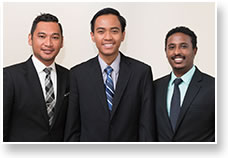A team of MBA accounting students recently finished in the 92nd percentile in an online integrated decision-making simulation that involved 1,125 master’s-degree-level teams worldwide. This team reflects the international character of MUM’s student population: John Ortaliza (Philippines), Rithy Um (Cambodia), and Elias Mengistu (Ethiopia).
This is the 12th consecutive time that at least one group of MBA students from MUM has finished in the top tenth percentile since they began participating in the simulation in 2011. Other U.S. universities that finished in the top tenth percentile in this window of the competition included Brigham Young University, Indiana University, University of Georgia, Drake University, Ohio University, and Seton Hall University.
“MBAs are expected to make decisions guided by analysis of quantitative data,” said Andrew Bargerstock, chair of the Accounting Department. “We feel that the Capstone Simulation results demonstrate the readiness of our students for job markets now and ultimately for executive leadership positions later.”
In the online Capstone Simulation points are earned through well-defined metrics based on the Balanced Scorecard, a concept developed by Robert Kaplan at Harvard University. It recognizes four perspectives for measuring performance: customer, financial, internal business processes, and learning/growth.
The students must manage both short-term and long-term metrics across eight rounds of decision-making, with each round representing one year. This entails using their knowledge of marketing, finance, operations, human resources, accounting, problem-solving, and data analysis. Team performance depends on their ability to analyze data and financial statements across eight years of business activities.
While not a real-time competition per se, the ongoing simulation allows MBA teams to compare their performance with all the other MBA teams who have participated in the previous six-month period from the end date of the last round of decisions.
“The experience I had from the simulation was a better understanding of how executive management makes decisions based on different perspectives,” said Elias Mengistu. “Maharishi’s quality executive management was exercised in all our management decisions; comprehension, creativity, initiative, vigilance, and foresight played a significant role.”
In addition to available concentrations in accounting, SAP-finance, and sustainable business practice, MBA students at MUM take a variety of general management courses that might include marketing, finance, human resource management, operations management, business law, data modeling, and data mining.
“My experience with the MBA program at MUM helped me grow professionally and personally,” said John Ortaliza. “The subjects covered in the Accounting Professionals program assisted in my preparation to take the US CPA examination, while the daily practice of TM took care of my focus, comprehension, foresight, and creativity.”
Approximately 200 students are currently enrolled in various specializations in the MBA program, including those on campus, those in their practicum phase, and in special-purpose corporate MBA programs.

 The miles of sidewalks that serve campus have been systematically repaired and upgraded over the past several months, made possible by generous contributors to the Annual Fund. At the writing of this post, repairs to the sidewalks around Building 112 are well underway and are expected to be completed soon.
The miles of sidewalks that serve campus have been systematically repaired and upgraded over the past several months, made possible by generous contributors to the Annual Fund. At the writing of this post, repairs to the sidewalks around Building 112 are well underway and are expected to be completed soon.












